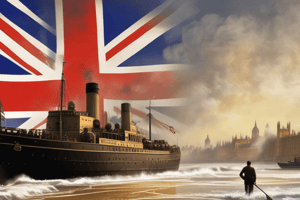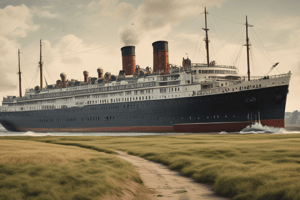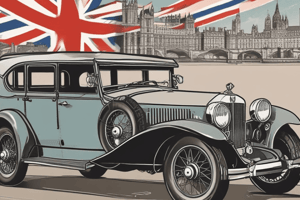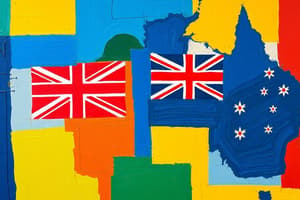Podcast
Questions and Answers
Which country supported the American colonies in their fight for independence?
Which country supported the American colonies in their fight for independence?
- Britain
- Spain
- France (correct)
- Portugal
What was Napoleon's goal in the early 19th century?
What was Napoleon's goal in the early 19th century?
- To become a democratic leader
- To limit French colonies overseas
- To expand French territory in Europe and overseas (correct)
- To form an alliance with Britain
Which battle marked a significant defeat for Napoleon?
Which battle marked a significant defeat for Napoleon?
- Battle of Trafalgar
- Battle of Waterloo (correct)
- Battle of Europe
- Battle of Saint Helena
Who led the British Royal Navy to victory at the Battle of Trafalgar?
Who led the British Royal Navy to victory at the Battle of Trafalgar?
What was the outcome of the Battle of Waterloo?
What was the outcome of the Battle of Waterloo?
Who was instrumental in Napoleon's defeat?
Who was instrumental in Napoleon's defeat?
What was the significance of the Battle of Trafalgar?
What was the significance of the Battle of Trafalgar?
What was the alliance that led to Napoleon's defeat at Waterloo?
What was the alliance that led to Napoleon's defeat at Waterloo?
What was the primary reason for Britain's policy of 'splendid isolation' in 1900?
What was the primary reason for Britain's policy of 'splendid isolation' in 1900?
What geographical advantage contributed to Britain's sense of security?
What geographical advantage contributed to Britain's sense of security?
What was a consequence of Britain's isolationist policy?
What was a consequence of Britain's isolationist policy?
What event exposed significant weaknesses in the British military?
What event exposed significant weaknesses in the British military?
Why did Britain enter World War I in 1914?
Why did Britain enter World War I in 1914?
What was a characteristic of Britain's 'splendid isolation' policy?
What was a characteristic of Britain's 'splendid isolation' policy?
What was a consequence of Britain's military inefficiency in the Boer War?
What was a consequence of Britain's military inefficiency in the Boer War?
What was a benefit of Britain's naval power?
What was a benefit of Britain's naval power?
What was the main period of conflict between England and France?
What was the main period of conflict between England and France?
Which of the following battles was NOT fought during the Hundred Years' War?
Which of the following battles was NOT fought during the Hundred Years' War?
What was the key factor that contributed to the English victories in the Hundred Years' War?
What was the key factor that contributed to the English victories in the Hundred Years' War?
Who was the English king who led significant victories for England during the Hundred Years' War?
Who was the English king who led significant victories for England during the Hundred Years' War?
What was the fate of Joan of Arc during the Hundred Years' War?
What was the fate of Joan of Arc during the Hundred Years' War?
What was the eventual outcome of England's control over French territories during the Hundred Years' War?
What was the eventual outcome of England's control over French territories during the Hundred Years' War?
What was the strategic importance of the city of Calais for England during the Hundred Years' War?
What was the strategic importance of the city of Calais for England during the Hundred Years' War?
What was the primary goal of the English during the Hundred Years' War?
What was the primary goal of the English during the Hundred Years' War?
Flashcards are hidden until you start studying
Study Notes
Britain's "Splendid Isolation" (1900)
- Britain adopted a policy of "splendid isolation" to stay out of European conflicts and avoid being dragged into wars that didn't concern them.
- Isolation was seen as freedom due to Britain's geographical advantage of being an island, the dominance of the Royal Navy, and the balance of power on the Continent.
- However, this policy led to a lack of friends and alliances, resulting in conflicts with Germany, France, and Russia over interests in the Pacific.
The Boer War (1899-1902)
- The Boer War exposed significant weaknesses in the British military, including incompetent leadership, inaccurate maps, and poor infrastructure.
- British forces suffered numerous defeats, highlighting the inefficiencies and lack of preparedness within the military.
Britain in 1914-1918
- During World War I, Britain became the ally and protector of France against the Germans.
- Britain entered the war in 1914 to support France and Belgium against the German invasion.
Into Modern History
- France supported the Americans in their War of Independence (1775-1783) against British rule.
- Britain supported Europe in the attempt to limit Napoleon's control, after he proclaimed himself emperor and planned to conquer Europe and expand French colonies overseas.
- Britain played a crucial role in the eventual defeat of Napoleon, contributing significantly to two major battles: the Battle of Trafalgar and the Battle of Waterloo.
The Battle of Trafalgar (1805)
- The British Royal Navy won the Battle of Trafalgar, led by Admiral Nelson, who used innovative strategies to defeat the French and Spanish fleets.
- The battle was a significant naval victory for the British.
The Battle of Waterloo (1815)
- Britain allied with Prussia, and defeated Napoleon at the Battle of Waterloo, led by General Wellington.
- The battle ended Napoleon's rule and his dream to dominate Europe.
- Napoleon was exiled to Saint Helena, where he died in 1821.
The Hundred Years' War (1337-1453)
- The Hundred Years' War was a series of conflicts waged between England and France.
- Famous battles during this period include the Battle of Crécy (1346) and the Battle of Agincourt (1415).
- The English won these battles, often attributed to their effective use of the longbow.
- Henry V was a heroic figure of this war, leading the English to significant victories.
- Joan of Arc was a French heroine who led the French in the war but was considered a witch by the English and was burnt at the stake in 1431.
- England lost control over French territories progressively until the 15th century, but maintained control over the city of Calais as a base for military and trade operations.
Studying That Suits You
Use AI to generate personalized quizzes and flashcards to suit your learning preferences.




